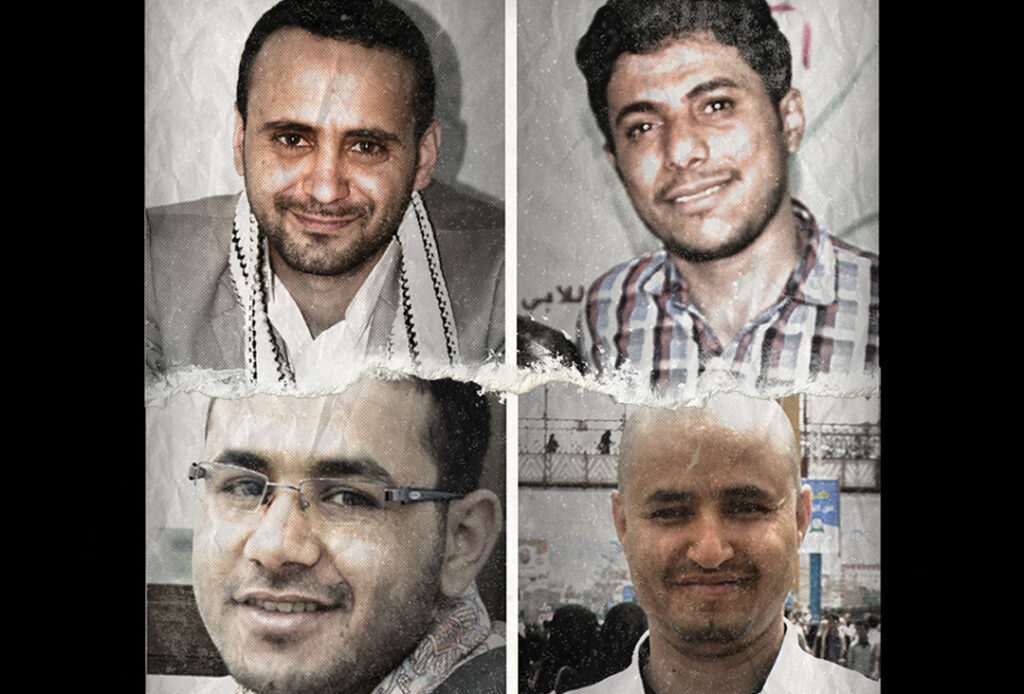Freedom of speech needs to be protected in a post-conflict Yemen
MAGED AL-MADHAJI, EXECUTIVE DIRECTOR, THE SANAA CENTER FOR STRATEGIC STUDIES | Photos BY YEMENI MINISTRY OF INFORMATION
For the past few years, women have been abducted in northern Yemen, tortured, raped, forced into false confessions of prostitution, and left traumatized and stigmatized — their punishment for publicly contradicting the Houthi authorities. This has been an open secret in Sanaa that independent Yemeni journalists should have been investigating, corroborating and publishing to shine light into every shadowy corner that nurtures such atrocities.
It is impossible, however, for journalists in northern Yemen to do the sort of work that holds authorities to account when any dissenting voice that rises above a whisper is silenced, whether press, activist or ordinary citizen.
Independent journalism hasn’t existed in Sanaa since the Houthis seized power in September 2014, and media organizations began shutting down, leaving only hand-picked sectarian propaganda outlets in their wake. Along with the closures, 10 journalists were abducted in 2015, jailed and tortured. Such a climate of fear breeds self-censorship among those left standing — play by the rules or lose your job, your freedom, your dignity, and perhaps even your life — and silences important stories like those of the abused women.
The climate was poisoned even more on April 11, 2020, when a deeply flawed “trial” concluded for the abducted journalists, whose charges included spying for the anti-Houthi military coalition. Four of them — Abdel-Khaleq Amran1, Akram al-Walidi2, Hareth Hamid3 and Tawfiq al-Mansouri4 — were sentenced to death. Six others convicted with them were ordered released with time served. By month’s end, only one, Salah al-Qaedi, was free. The journalists had been forcibly “disappeared” for six months, tortured, denied medical treatment and deprived of their right to due process. The Houthis lack any legal or constitutional legitimacy to run courts, meaning carrying out the sentences would amount to extrajudicial killings.
Houthi authorities are aware of the threat independent journalism poses to a regime that relies on corruption, intimidation, violence and abuse, though their animosity runs surprisingly deep. They have shown reckless disregard toward journalists again and again, including when they held Abdullah Kabil and Yousef Alaizry captive in 2015 in a building that had been repeatedly bombed, only for them to be buried in its rubble on its next hit.
Furthermore, since the war began, the Houthis have exchanged prisoners with al-Qaida, released hundreds of enemy forces’ fighters and, most recently, offered an exchange for five Saudi Soldiers who included a pilot shot down over Al-Jawf in February 2020. But they have rejected every call for the release of the journalists on death row, rebuffing foreign and domestic mediation attempts. A Soldier may kill you, but apparently, it’s worse if a journalist exposes your true nature.
Laudable international calls to protect journalists are being made to honor World Press Freedom Day, including some urging the Houthis to quash the verdicts and free Yemen’s jailed journalists. Yemeni journalists outside Houthi-run territory also shouldn’t be forgotten in media-freedom calls, where journalists have been intimidated into silence and attacked and detained by various forces, though generally released more quickly than those who fall into Houthi hands.
These days, in light of the broader threat of COVID-19 and the inability to socially distance in prisons, the Yemeni government and the Houthis have released several hundred prisoners combined to ease crowding. Journalists and political opponents don’t appear to have been among them, though. With the coronavirus spreading now in Yemen, authorities on both sides of the front lines must go further and release political detainees, including all journalists held by the Houthis.
Efforts to restart the political process in Yemen have picked up steam, and there is a risk Houthi human rights abuses toward any independent thinkers will be tacitly accepted for the greater goal of ending the war. That cannot be allowed to happen. Any such compromise of basic rights — allowing everyone to reach a consensus that these rights don’t matter — will, in the long term, only lead to more bloodshed and oppression.
Authoritarian regimes cannot be expected to show concern for such human rights abuses, so the United Nations and European countries will need to push the Houthis and other parties to free journalists and other political prisoners. If such behavior remains unchallenged and expediency trumps human rights in a cease-fire and political settlement, the world is once again saying that when it comes to persecuting journalists, activists and dissidents, brutality is acceptable toward your own people if it provides stability and protects the interests and borders of your wealthier neighbors.

